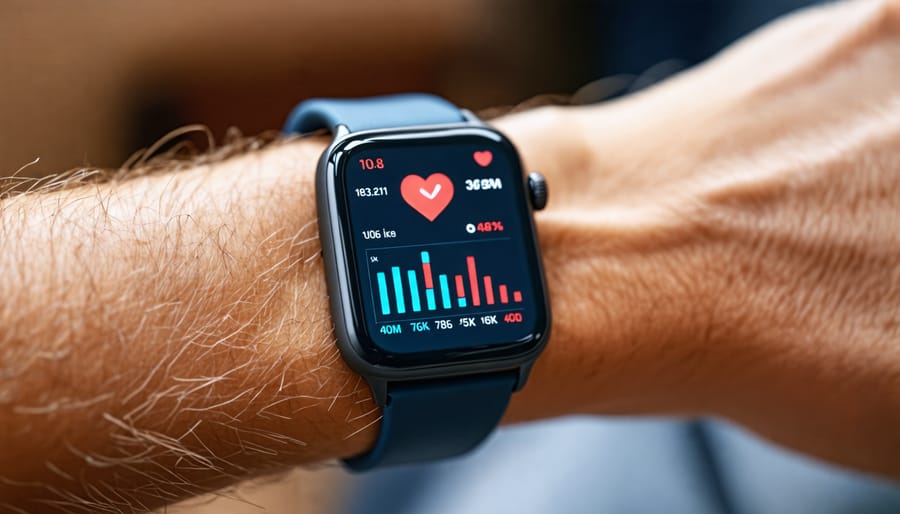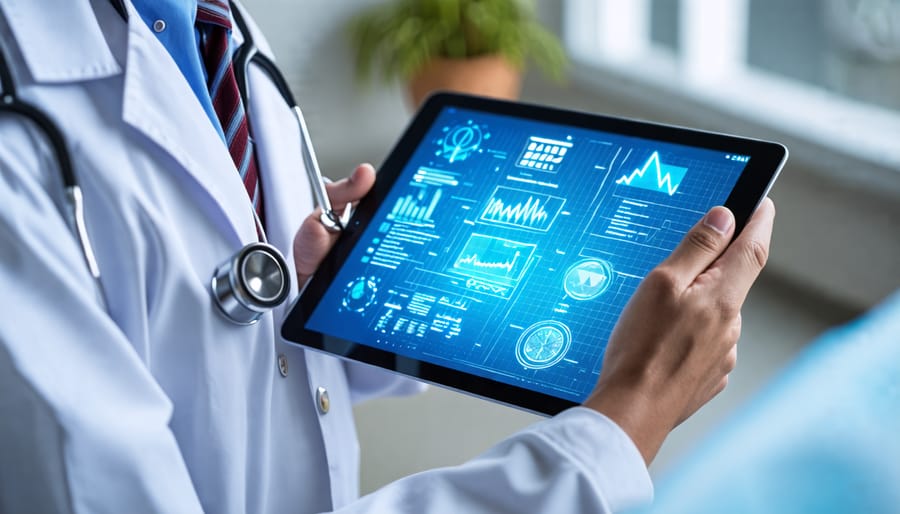From virtual doctor visits to AI-powered disease prediction, technology is revolutionizing healthcare in Alberta. Telemedicine enables patients to consult with specialists from home, increasing access and convenience. Wearable devices like smart watches empower individuals to monitor their health in real-time, catching early warning signs of chronic diseases. AI algorithms analyze vast medical datasets to provide personalized treatment recommendations and flag patients at high risk. By harnessing these innovations, Albertans can take a more proactive role in their wellbeing. Technology puts preventive health tools directly in patients’ hands, equipping them to make informed decisions. From remote monitoring to predictive analytics, digital solutions are transforming how we prevent, diagnose and manage health conditions. The future of healthcare in Alberta is increasingly tech-driven, accessible and personalized.
Telemedicine: Bringing Care to Your Doorstep
Telemedicine is revolutionizing healthcare access in Alberta, particularly for those living in rural areas or facing mobility challenges. Through innovative platforms, patients can now connect with healthcare providers from the comfort of their own homes. This eliminates the need for lengthy travel and reduces barriers to receiving timely care.
In Alberta, several telemedicine solutions are making a significant impact. For example, the Alberta Netcare eReferral system allows primary care providers to securely send referrals and consult with specialists electronically. This streamlines the referral process and enables faster access to specialized care.
Another notable initiative is the Remote Monitoring Program offered by Alberta Health Services. This program provides patients with chronic conditions, such as diabetes or heart disease, with remote monitoring devices. These devices transmit vital health data to healthcare teams, allowing for proactive management and early intervention when needed. By catching potential issues early, the program aims to prevent complications and improve overall health outcomes.
Telemedicine is also proving invaluable for mental health support. Platforms like Telus Health MyCare connect Albertans with licensed counselors and therapists through secure video sessions. This service expands access to mental health resources, particularly in underserved areas where in-person options may be limited.
The adoption of telemedicine in Alberta is not only increasing healthcare accessibility but also empowering individuals to take a more active role in managing their health. With the ability to easily connect with healthcare providers and access health technologies, Albertans can make informed decisions and receive prompt support for their health concerns. As telemedicine continues to evolve, it holds immense potential to transform healthcare delivery and improve the well-being of communities across the province.


Wearable Devices: Your Personal Health Guardians
Wearable devices have become indispensable tools in the quest for better health among Albertans. These innovative gadgets, ranging from smartwatches to fitness trackers, act as personal health guardians by continuously monitoring vital signs, tracking physical activity, and aiding in the early detection and management of chronic conditions.
For health-conscious individuals, wearables provide real-time insights into heart rate, sleep patterns, and activity levels, empowering them to make informed decisions about their lifestyle. By setting personalized goals and receiving regular feedback, Albertans can take proactive steps towards improving their overall well-being.
Moreover, wearable devices play a crucial role in the management of chronic diseases such as diabetes, hypertension, and cardiovascular disorders. By continuously monitoring glucose levels, blood pressure, and heart rhythms, these devices enable individuals to keep track of their condition and alert them to any abnormalities. This early detection allows for timely interventions and helps prevent complications.
One remarkable example of wearable technology being used in Alberta is the , a smartwatch-like device that uses advanced sensors to detect early signs of seizures in individuals with epilepsy. By alerting caregivers and loved ones, this innovative wearable helps ensure prompt assistance and enhances the safety of those living with this neurological condition.
As wearable devices continue to evolve, they are becoming increasingly integrated with telemedicine platforms and electronic health records. This seamless integration allows healthcare providers to access real-time patient data, enabling personalized care plans and remote monitoring. By bridging the gap between patients and healthcare professionals, wearables are transforming the way we approach preventive care and chronic disease management in Alberta.
Electronic Health Records: Connecting Your Care Team
Electronic health records (EHRs) have revolutionized the way healthcare providers communicate and collaborate in Alberta. By digitizing patient information, EHRs enable seamless sharing of crucial data between primary care physicians, specialists, pharmacists, and other members of a patient’s care team. This enhanced connectivity reduces the risk of medical errors caused by incomplete or outdated information, ensuring that all providers have access to a comprehensive view of a patient’s health history.
In addition to improving patient safety, EHRs empower Albertans to take a more active role in their own healthcare. Many EHR systems offer patient portals, which allow individuals to securely access their medical records, view test results, and communicate with their healthcare providers. This level of transparency and engagement helps patients better understand their health conditions and make informed decisions about their care.
Across Alberta, clinics and hospitals have successfully implemented EHR systems, leading to improved patient outcomes and increased efficiency. For example, the Calgary West Central Primary Care Network has seen significant benefits since adopting an EHR system. By streamlining communication and reducing paperwork, the network’s healthcare providers can spend more time focusing on direct patient care. Similarly, the University of Alberta Hospital has leveraged its EHR system to enhance care coordination for patients with complex medical needs, resulting in shorter hospital stays and fewer readmissions.
As EHR technology continues to advance, Albertans can expect even greater benefits in the years to come. With the power of connected care teams and empowered patients, EHRs are poised to play a crucial role in improving the health and well-being of our communities.

AI in Diagnostics: Enhancing Accuracy and Speed
Imagine a future where artificial intelligence (AI) works hand-in-hand with healthcare professionals to diagnose diseases faster and more accurately than ever before. In Alberta, this future is already becoming a reality. AI-powered diagnostic tools are being developed and implemented in our healthcare facilities, enhancing the speed and precision of diagnosing various conditions.
One example is the use of AI algorithms to analyze medical images, such as X-rays, CT scans, and MRIs. These intelligent systems can quickly identify abnormalities and signs of disease, helping radiologists and physicians make more accurate diagnoses in a fraction of the time. By catching diseases early, patients can receive timely treatment and potentially avoid complications.
AI is also being applied to analyze patient data, including electronic health records, lab results, and genetic information. By identifying patterns and risk factors, AI can assist healthcare providers in making personalized diagnostic and treatment decisions. This is particularly valuable for complex or rare diseases that may be challenging to diagnose through traditional methods.
In Alberta, researchers and healthcare institutions are at the forefront of developing and testing these AI diagnostic tools. For instance, the University of Alberta is working on AI systems to detect early signs of Alzheimer’s disease and predict the risk of heart attacks. Calgary’s Foothills Medical Centre is using AI to analyze lung CT scans for signs of COVID-19.
As AI continues to advance, it has the potential to revolutionize the diagnostic process, making it more efficient, accurate, and accessible for Albertans. While AI will not replace the expertise and human touch of healthcare professionals, it can serve as a powerful tool to support them in providing the best possible care for patients.
Mobile Health Apps: Empowering Self-Care
In today’s fast-paced world, mobile health apps are revolutionizing the way Albertans manage their well-being. These innovative tools, conveniently accessible through our smartphones, empower us to take control of our health like never before. Whether you’re looking to adopt a healthier lifestyle, stay on top of your medications, or effectively manage chronic conditions, there’s an app for that.
Popular apps like MyFitnessPal and Fitbit allow users to track their daily physical activity, monitor nutrition, and set personalized goals. By providing insights into our habits and progress, these apps motivate us to make positive changes and stick to them. For those managing chronic conditions such as diabetes or hypertension, apps like mySugr and Blood Pressure Companion offer seamless tracking of vital health metrics, making it easier to stay on top of your health between doctor visits.
Medication adherence is another area where mobile health apps excel. Apps like Medisafe and Round Health send timely reminders, ensuring you never miss a dose. They also provide valuable information about potential side effects and drug interactions, promoting safer self-care practices.
As Albertans increasingly embrace mobile health apps, the impact on our collective well-being is undeniable. By putting the power of health management at our fingertips, these apps are transforming the way we engage with our health, fostering a more proactive and prevention-focused approach. Whether you’re a busy professional, a parent juggling family responsibilities, or a senior looking to maintain independence, mobile health apps offer a convenient and effective way to prioritize your health and well-being.
Conclusion
In conclusion, technological innovations are revolutionizing healthcare in Alberta, empowering individuals to take charge of their health and well-being. From telemedicine platforms that provide convenient access to medical professionals, to wearable devices and mobile apps that enable real-time monitoring of chronic conditions, these advancements are making a significant impact on disease prevention and management. Artificial intelligence and machine learning are also playing an increasingly important role, helping healthcare providers make more accurate diagnoses and personalize treatment plans. By embracing these technologies, Albertans can benefit from improved health outcomes, reduced healthcare costs, and a better quality of life. Whether you’re at risk of developing a chronic disease or already managing one, leveraging these technological tools can help you stay on top of your health and make informed decisions about your care. So, let’s work together as a community to promote the adoption of these innovative solutions and create a healthier future for all Albertans.

